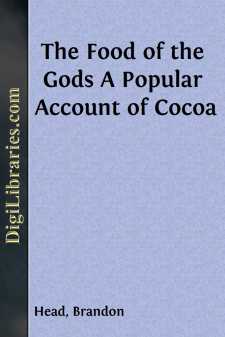Categories
- Antiques & Collectibles 13
- Architecture 36
- Art 48
- Bibles 22
- Biography & Autobiography 813
- Body, Mind & Spirit 142
- Business & Economics 28
- Children's Books 15
- Children's Fiction 12
- Computers 4
- Cooking 94
- Crafts & Hobbies 4
- Drama 346
- Education 46
- Family & Relationships 57
- Fiction 11828
- Games 19
- Gardening 17
- Health & Fitness 34
- History 1377
- House & Home 1
- Humor 147
- Juvenile Fiction 1873
- Juvenile Nonfiction 202
- Language Arts & Disciplines 88
- Law 16
- Literary Collections 686
- Literary Criticism 179
- Mathematics 13
- Medical 41
- Music 40
- Nature 179
- Non-Classifiable 1768
- Performing Arts 7
- Periodicals 1453
- Philosophy 64
- Photography 2
- Poetry 896
- Political Science 203
- Psychology 42
- Reference 154
- Religion 513
- Science 126
- Self-Help 84
- Social Science 81
- Sports & Recreation 34
- Study Aids 3
- Technology & Engineering 59
- Transportation 23
- Travel 463
- True Crime 29
The Food of the Gods A Popular Account of Cocoa
by: Brandon Head
Categories:
Description:
Excerpt
I. ITS NATURE.
When one thinks of the marvellously nourishing and stimulating virtue of cocoa, and of the exquisite and irresistible dainties prepared from it, one cannot wonder that the great Linnæus should have named it theo broma, "the food of the gods." No other natural product, with the exception of milk, can be said to serve equally well as food or drink, or to possess nourishing and stimulating properties in such well-adjusted proportions. Few, however, realize that in its stimulating properties cocoa ranks ahead of coffee, though below tea. As a matter of fact, the active principles of all three are alkaloids, practically identical and equally effective. Each derives its value from its influence on the nervous system, which it stimulates, while checking the waste of tissue, but the cocoa-bean provides in addition solid food to replace wasted tissue. It is, indeed, so closely allied in composition to pure dried milk, that in this respect there is little to choose between an absolutely pure cocoa essence and the natural fluid. It is this which makes it invaluable as an alternative food for invalids or infants.
Cacao Trees, Trinidad.An early English writer on this valuable product spoke truly when he remarked: "All the American travellers have written such panegyricks, that I should degrade this royal liquor if I should offer any; yet several of these curious travellers and physicians do agree in this, that the cocoa has a wonderful faculty of quenching thirst, allaying hectick heats, of nourishing and fattening the body."
A modern writer affords the same testimony in a more practical form when he records that: "Cocoa is of domestic drinks the most alimentary; it is without any exception the cheapest food that we can conceive, as it may be literally termed meat and drink, and were our half-starved artisans and over-worked factory children induced to drink it, instead of the in-nutritious beverage called tea, its nutritive qualities would soon develop themselves in their improved looks and more robust condition."
Such a drink well deserved the treatment it received at the hands of the Mexicans to whom we are indebted for it. At the royal banquets frothing chocolate was served in golden goblets with finely wrought golden or tortoise-shell spoons. The froth in this case was of the consistency of honey, so that when eaten cold it would gradually dissolve in the mouth. Here is a luscious suggestion for twentieth century housewives, handed to them from five hundred years ago!
ANCIENT MEXICAN DRINKING CUPS.(British Museum.)
In health or sickness, infancy or age, at home or on our travels, nothing is so generally useful, so sustaining and invigorating. Far better than the majority of vaunted substitutes for human milk as an infant's food, to supplement what other milk may be available; incomparable as a family drink for breakfast or supper, when both tea and coffee are really out of place unless the latter is nearly all milk; prepared as chocolate to eat on journeys, and in many other ways, cocoa is a constant stand-by....


